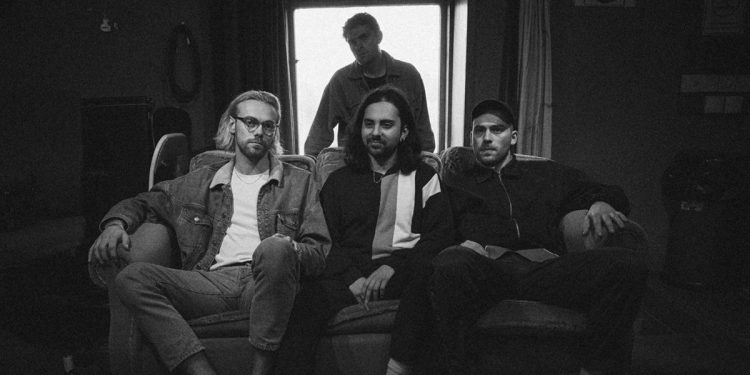A Q&A with KOYO

Prog-leaning Leeds quartet – here’s Huw Edwards
from KOYO…
‘La Cucaracha’ has been described as an anthem for determination and persistence. Can you elaborate on the inspiration behind this track and how it represents your band’s journey?
I got the inspiration from Better Call Saul. The Mexican drug lord Lalo calls Saul “la cucaracha” because he views him as a born survivor. I related it to us because like so many others we found it tough during Covid and came close to splitting up. We felt we were riding high pre-Covid off the buzz of our first album and were excited to release our follow-up, however, we released it at a time when the world was just going into lockdown. We never got to tour it and so many of the connections we’d worked hard to make were either out of work, focused on more important things or moved on once things opened up again. Coming out of it, it really felt like we were starting again. Anyway, we didn’t split up and instead chose to pick ourselves up and throw ourselves into another album. Over time we’ve started to see the riff in the song as a metaphor for that, how it keeps coming back for more with more aggression each time!
‘Mechanical Bull’ touches on themes of growing up and finding stability. How did your personal experiences shape this song?
I think we’ve all grown up a lot over the past few years. When we started out we were just kids and we hadn’t even considered the possibility that we might not make it. We were just tunnel vision shooting for the stars, gigging as much as we could and riding the wave. Without realising it we’d put all our value into the idea of being in a band so when we were faced with the idea of having to consider other paths we didn’t know what to do with ourselves! We realised this and put a lot of work into correcting it. We’re all in a much better place now. Of course, we’re not gonna sit here and pretend we wouldn’t be over the moon if the album does well and pushes the band forwards, but if it doesn’t we’re still happy in our lives outside of it! This is just something that we’re super proud of and ultimately want to be able to look back on later in our careers and say that we did.
Your new album ‘Onism‘ is set to release in Autumn 2024. Can you give us a sneak peek into what fans can expect from this project in terms of musical direction and themes?
Musically this album lies somewhere between the first and second album. At its core it’s a straight-up rock album. It’s got more of the progressiveness of the first, where we just wanted to push boundaries and not restrict ourselves in any way. To just have fun with it. The difference is now we’ve got a lot more experience than when we made the first album, we’re much better musicians. Sonically it’s closer to the second album, we got the same guy to come in and mix it who we were really happy with the last time around. However, I’d say it’s a little rawer. We were really inspired by albums like Vulgar Display of Power, Rage Against The Machine and Blood Sugar Sex Magik where it’s just the sound of each member’s performance complimenting one another. No thrills. Almost like it’s live but at the same time produced in a way that feels high quality, like a record. Just focusing on the performance and capturing that as best we can, and if the performance is good, the album will be good. No overcompensating in post-production. Lyrically it’s more cryptic, philosophical, metaphorical. A direct reaction to the last album which was stacked with break-up songs, we had an aversion to that this time round!
After nearly four years since your sophomore album, how has your sound and overall approach to making music evolved with ‘Onism’?
While making this album we’ve put a lot of work into reconnecting with the childlike enthusiasm that made us start bands in the first place. We’ve been trying to rid ourselves of any pretentious music snobbery, listening to the bands we grew up listening to. We made this album for us. When recording we were high-fiving over drum fills and riffs, jamming and just having a great time pushing each other and supporting each other. That’s how we made our first album, there were no limits back then. And that’s not to say we’re not insanely proud of what we achieved on our second album, we were just in a different headspace at the time. We were into the idea of making a different kind of album.
You’ve mentioned battling a creative block after your second album. What strategies did you use to overcome this and reignite your creativity for the new album?
We took some time out which really helped. We were really burnt out and deflated with the timing of the release and everything. Then like I said we just started trying to get back to the things that made us fall in love with music in the first place. We stopped trying to put too much pressure on ourselves, always chasing something, but instead tried to just play for the love of it. And trying to believe in ourselves as well, not always trying to reach for something that we’re not or leaning too much on others. Yes, push yourself. Yes, strive to be better. But have a strong mindset and believe in your own abilities. We’ve also been picking up on some albums that went over our heads the first time round. Like Rust In Peace. I was always put off by Dave Mustaine’s voice but something just clicked with that recently. That album slaps!
Working with producer Mike Horner again, what has his influence brought to ‘Onism’ compared to your previous albums?
Last time he was involved with the production. We learnt so much from him. He let us in on some of the tricks of the trade and really helped us refine our ideas and service the song, not getting too attached to things. He also mixed the last record and he’s just insanely good at that as well, he just notches things up a gear sonically. This time we produced the record ourselves. We just had such a strong vision by the time we started recording that we just wanted to see that out and the experience we’ve gained doing the first two albums, working with guys like Mike and Tom Wild who worked with us on album one, allowed that to be possible this time round. However, we knew we still wanted Mike to mix it. And he absolutely smashed it. We wanted it raw but polished and that’s exactly what he helped us to achieve.

Your live performances are known for their energy and power. How do you translate that same intensity into your studio recordings?
Like I said before, this time round we really focused on the performance. We made sure before we even went into the studio that we were well rehearsed. We didn’t want to be half-ready and then do loads in post-production, overdubbing to compensate later; we just wanted to go in, play and just capture the performance in the most authentic way we could. A lot of bands don’t do that, they just kind of build it as they go along, which we’ve done in the past too. But I think you lose that energy and rawness along the way.
Having faced an identity crisis while working on this album, how did you reconnect with the enthusiasm that initially made you start the band?
I think we were just going in two different directions when we started writing for this album. Initially we were writing songs that leaned even more into where we going with the second album. We were becoming more of a “songs” band. But then there was this part of us that wanted to lean even heavier into where we were going with the first album and just go bonkers. But then we realised we can’t do both. Ultimately we knew the album needed to take one idea and absolutely nail it. We wanted to nail the KOYO sound and make a more definitive album so in the end we picked the latter. I think once we realised this there was no stopping us after that.
With ‘La Cucaracha’ and ‘Mechanical Bull’ being described as progressive rock anthems, what influences have shaped the sound of these tracks and the upcoming album as a whole?
We grew up on rock music and heavy metal. Then we met at uni whilst studying at Leeds Conservatoire and spent that time broadening our horizons, listening to everything from Nick Drake to Kendrick Lamar, Tower of Power, Christian Scott, Boards of Canada and Meshuggah! So naturally I think we ended up really proggy because we were channelling so much influence into the music. This time we didn’t want to disappear too far up our own ars*s and like I said just get back to our roots. So at its core, this is a rock album. This is four guys just having a great time doing what they love the most. We’ve been listening to Metallica, Faith No More, QOTSA, Alice In Chains, GN’R, Sabbath, Hendrix, Led Zeppelin, Mastodon, Opeth, Megadeth, Pantera, RHCP, RATM, Ozzy, Van Halen, Aerosmith. The list goes on! At it’s core this album is the most rock album we’ve ever done.
Finally, if you could collaborate with any artist, dead or alive, who would it be and what kind of project would you create together?
I’m just gonna go with what I’m listening to at the moment as otherwise we’ll be here all day! I’d love to play guitar in a band with Mike Patton on vocals, Trent Reznor on synths and producing, Nick Menza (RIP) from Megadeth on drums and Bob Daisley on bass. That guy is a secret weapon! He was basically there in the background writing and playing bass every time Ozzy turned out a decent album!
Listen to KOYO on Spotify









